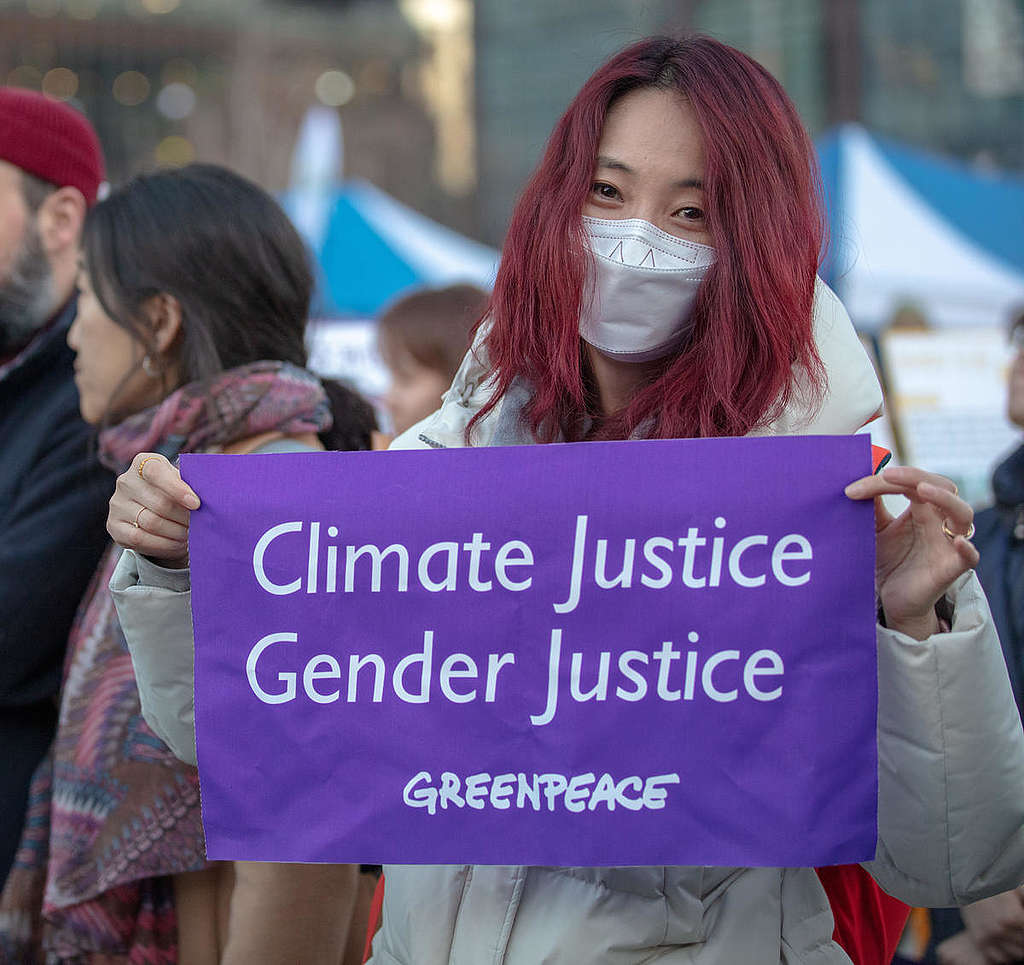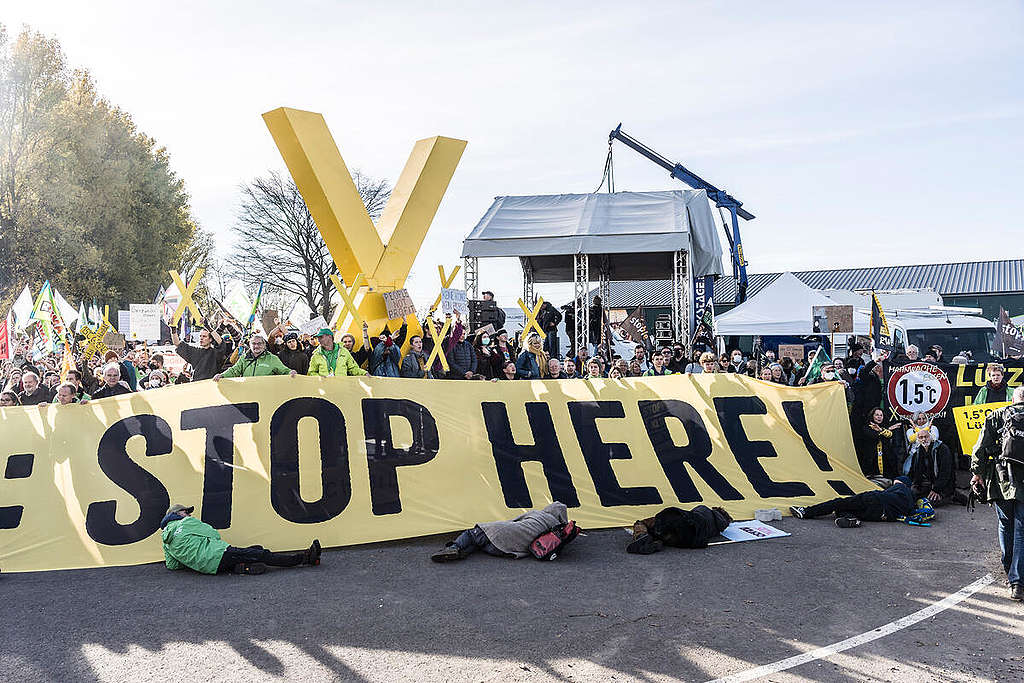 Staff and volunteers of Greenpeace Seoul office joined the International Women’s Day march held in Gwanghwamun, Seoul, in 2019 © Soojung Do / Greenpeace
Staff and volunteers of Greenpeace Seoul office joined the International Women’s Day march held in Gwanghwamun, Seoul, in 2019 © Soojung Do / GreenpeaceToday is International Women’s Day. Every year, fossil fuel companies exploit this day to advertise their career options for women, call out the gender gap in science and engineering, and sponsor cultural events celebrating women and gender minorities.
As progressive as this might sound, it is nothing but public relations smoke and mirrors.
Behind the glowing claims lurks a sobering reality: women and gender minorities are disproportionately harmed by the fossil fuel industry’s corporate violence and destruction.
We already know the fossil fuel industry is responsible for the climate crisis and its catastrophic impacts, and for the pollution of our air, water and land that makes people sick. But their business models are reportedly driving inequality and fuelling sexual and physical violence against women and gender minorities.
Fossil fuels role in gender-based violence
So what evidence is there? For starters, the fossil fuel industry’s resource extraction projects reportedly go hand-in-hand with a surge in sexual and physical violence against women and gender minorities. Temporary settlements for workers on oil and gas fields and other fossil fuel infrastructure, also known as “man camps”, allegedly lead to increased cases of rape, sexual assault and harassment, human trafficking and other violent crimes against women and gender minorities. Indigenous women and gender minorities are particularly at risk, and Indigenous women are leading movements for justice and safety.
One example of many are the brutal consequences of the Bakken “oil boom” in North Dakota that led to the arrival of thousands of transient male workers to the area, which has been associated with a surge in rates of violent crime and aggravated assault. At least 125 Indigenous women were reported missing during this time, but the true number is likely to be even higher.
Energy sector is riddled with economic gender inequality
Also, inside the inherently patriarchal energy sector, extractive industries like coal, oil and gas traditionally have the lowest percentage of female employees and even fewer women who reach managerial positions. Wages for female employees in the energy sector are almost 20% lower than for male employees in some European countries. In 2021, the fossil fuel industry had the largest gender pay gap compared to other science, technology, engineering, and math (STEM) industries in Australia. And in Canada for example, the extractive industry is allegedly among the largest single drivers of income inequality, contributing to an astonishing 6.7% of the national wage gap.
Economic gender inequality can be expected to grow as a result of the current energy crisis, reversing years of progress, as women are impacted disproportionately by rising energy costs due to their lower average income. While many women and gender minorities, and the people that depend on their income, struggle to make ends meet, the fossil fuel industry is making record-breaking profits.
Crises hit women and gender minorities harder than others
Women bring vital skills, resources and experience to humanitarian response. And when crises happen, they are often the first responders, taking risks and playing critical roles in the survival of families and communities. But women and gender minorities are also hit harder by the fossil-fuelled climate crisis, on average, they have lower incomes and less access to information.
In times of disasters, women and gender minorities are more likely to be injured and less likely to survive. Those who do survive have limited access to disaster relief and assistance, and face increased risk of sexual and physical violence, especially if they are displaced by climate change and living in overcrowded transitional housing, where they lack privacy and security. In short, the fossil fuel industry is driving the climate crisis and thus widening existing gender inequalities and discrimination.
A global energy shift could be key to solving the issues
The fossil fuel industry is inherently criminal; it is rooted in colonial, capitalist and patriarchal systems that rely on the oppression of people and exploitation of finite natural resources, particularly in the Global South. Even if the energy sector was more diverse and inclusive in their management roster with equitable pay, unless their practices and structures fundamentally change, that would be the epitome of genderwashing. A global shift to renewables presents an opportunity to rectify this.
This International Women’s Day, let’s fight back against the patriarchal and criminal fossil fuel industry. Let’s hold them accountable for their crimes. New fossil fuel infrastructure projects should be banned, and fossil fuels must be phased out once and for all. A feminist fossil-free future is the only way to achieve climate justice and prevent a climate catastrophe. Everyone’s lives depend on it.

Join the call for climate justice. Add your name to demand that fossil fuel companies stop their climate-wrecking activities.
Lisa Göldner is Greenpeace’s Lead Campaigner for the Fossil Free Revolution campaign based in Berlin, Germany.
This op-ed was originally published by Euronews on 8 March 2023.
Gender is an evolving socially constructed category of the human experience and exists on a spectrum rather than a binary system. In order to avoid reproducing the binary system, we chose to speak of women and gender minorities in this article. Gender minority is an umbrella term that refers to transgender and gender non-conforming people.
However, to this date most of the research done on the gendered-impacts of the climate crisis and of fossil fuel extraction as well as on other topics is done based on sex/gender-disaggregated data, and non-binary measurements of gender are usually not included in large-scale studies.
In an effort to find a balance between breaking the binary gender construction and our commitment to cite research findings accurately, we chose to use the terms “female” and “women” when referring to research that was based using only sex/gender-disaggregated data, but speak of “women and gender minorities” for the rest of the article.

 1 year ago
66
1 year ago
66
 (@greenpeace)
(@greenpeace)

